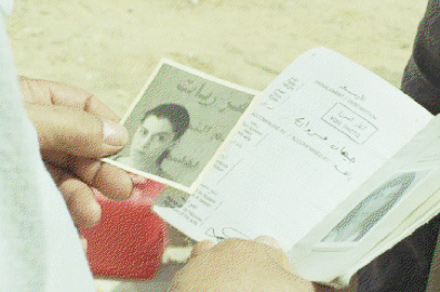
Yesterday my mom invited me to see a film in French that she’d heard good things about. Little did I know as I settled into my seat I was facing, not a screen, but a mirror. It’s one thing to watch a mother-child film with your mother. But it takes it to another level to watch the tale of a Middle Eastern mother’s experience with your mother — who happens to be an immigrant from said region herself. Specifically, Incendies is about a woman whose death prompts (ok, the death doesn’t, the letters she leaves behind do) her children to realize that maybe they didn’t know her at all.
The movie is gorgeous shot after shot of a country in the Middle East. It’s a country torn by violence. Check. And prejudice. Check. It’s set against beautiful views. Check. And troubled history. Check. The truth is, it could be anywhere in the Arabic-speaking Middle East. The fact that this country is never named is as important as any other element of the movie. The acting, as in most powerful films, is as much in its silent moments as in its dialogue. Against this background, the story operates with flashbacks to the mother’s history moving forward while the children retrace her steps.
Seeing this movie reminded me how lazy we can be with our family history. By “we” I mean the children of parents who immigrated to the United States, gave us our Nintendos and our Michael Jackson posters, and didn’t require us to become fluent in their history. Without them spoon feeding it to us, how connected do we choose to be with the lives they led before us?
While every parent can have secrets or a past their kids don’t quite get, parents who have immigrated add another layer to this mystery. The mystery comes from the fact that they have to communicate not only their stories and experiences, but set against a backdrop their children can hardly imagine. A lot of them choose not to take on the challenge of describing a world they know their children can’t envision. So they play along with the new lives they have created here.
As the daughter walked her mother’s village I realized that is an experience many people never have- it takes a trip to the motherland and escaping constant family eating marathons in order to see landmarks that meant something to your parents. We rarely get to meet people who knew our parents in a non-family context. While I have friends who debated pledging the same sorority as generations in her family, I struggle to remember the names of my parents’ colleges.
In the case of Iranian children, our parents’ own memories are further challenged by the fact that, since they left, the street names have changed, as if the country doesn’t want them to be able to remember.
Immigration is a tough experience, particularly when people don’t always choose it. I can’t imagine up and moving to Japan, even though I’ve heard great things about it; getting fluent in Japanese and raising my children so that’s what we speak at home. I can’t imagine them telling me they’re not in a rush to see the United States and that they consider themselves Japanese. It’s unfathomable to me, but that’s basically what happened to my parents.
As the daughter in the film continued moving forward, uncovering step after step of her mother’s secret life, I wondered: was it a question of her not having asked enough questions? Or the right questions? Do we assume if something is important that our parent will bring it up? In many cases, I think we are guilty of thinking it’s easier to just let things be.
“Incendies” trailer:






